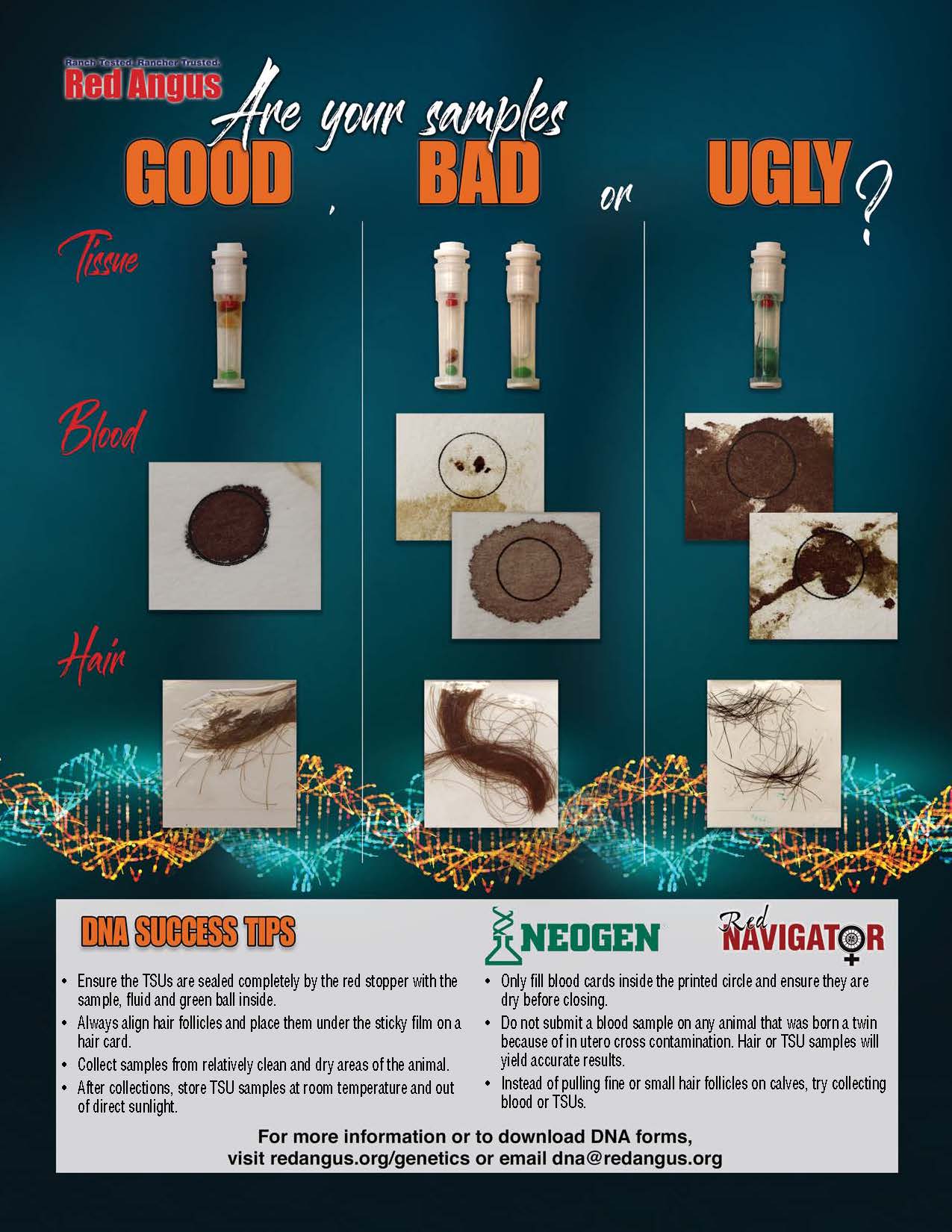The Neogen lab utilized by RAAA is located in Lincoln, Nebraska. The Animal Information page on the order form below can be filled out electronically and forwarded to dna@redangus.org, or completed by hand. Please include a signed hard copy of the form with the samples sent to RAAA. Basic testing prices are outlined below.
| Test | Price | Added on to GGP |
| AM, CA, MA, NH, OS | $20 | NH Only: $10 |
| DD | $25 | $20 |
| SeekSire Parentage (SNP) | $15 | |
| GGP-LD (Low Density)* | $50 | |
| GGP-LD Defect Bundle* | $95 | |
| GGP-uLD (Ultra Low Density)* | $35 | |
| Bovine Viral Diarrhea (BVD) | $8 | $6 |
| Hair Sample Submission Fee | $5 | |
| Semen Sample Submission Fee | $2 | |
| Sample Pull Retrieval Fee | $2 |

*Requires RAAA Registration prior to sample submission.
DOWNLOAD PDF DOWNLOAD SPREADSHEET
Aside from basic parentage and defect testing options, Neogen offers three variants of genomically enhanced tests (GGP-uLD, GGP-LD and GGP-LD Defect Bundle). These tests are labeled as GGP (GeneSeek Genomic Profile) and all include data to enhance your registered animals EPDs and parentage verification. To read more about GGP testing, click here. Click here to read about DNA sample collection and use the guide below to help you identify if your sample is good, bad or ugly. 
In the last five years, significant advancements have been made in the power of DNA technology. The foundation of the vast majority of those advancements is largely due to the ability to accurately identify Single Nucleotide Polymorphisms (SNP). Initially, this technology was cost prohibitive; however, advancements have allowed this technology to become the most cost-effective DNA technology available.
The “quickly becoming obsolete” DNA technology of Short Tandem Repeat (STR), also known as Micro-Satellite, has been largely replaced with SNP DNA technology for parentage determination and genetic defect testing in beef cattle. In fact, machines that perform STR are no longer manufactured.
In June 2011, the RAAA Board of Directors approved transitioning from STR to SNP DNA technology for parentage determination purposes. Effective July 1, 2012, RAAA will only accept parentage results conducted using SNP DNA technology. RAAA has deployed multiple strategies to support a cost-efficient and seamless transition. The most significant implemented strategy: RAAA taking a more active role in the DNA process by bringing parentage and genetic defect work ‘in-house.’ Through leveraging member’s collective buying power, this change will significantly reduce the cost of parentage and genetic defect testing. Additionally, this structure will allow for efficiencies to be gained in the registration of animals.
“Beginning with the 2017 calf crop, all bulls that are the source of natural mating (pasture breeding), parent verification is required to the extent that the parent(s) SNP parentage genotypes are on file at an approved testing facility. A copy of the DNA record on such bull must be on file with the Association as a requirement of progeny registration. DNA typing of the bulls to be used as AI sires will be at the submitting party’s expense. (Rev. 6-15, beginning with calves born on or after January 1, 2017).”
Please see Section I of the RAAA Breeders Guide for all DNA requirements.
No species is immune from genetic defects; several genetic defects have been discovered, and for the most part eliminated, in breeds of cattle. Due to their inheritance pattern, genetic defects can remain hidden for many generations, often not rearing their "ugly head" until some degree of inbreeding is practiced. Most genetic defects exist as simple recessives.
The majority of abnormal appearing calves are not genetic defects. Environmental effects such as the virus BVD and toxic weeds can mimic genetic defects. Therefore, extensive testing must be performed to rule out all non-genetic causes. Reference your RAAA Rules and Regulations (pg 17) to review the steps for investigating possible genetic defect carriers and a description of all genetic defects monitored by RAAA. Abnormal calves should be immediately reported to the National Office. It is imperative that the abnormal animal not be destroyed, as an autopsy must be performed and samples taken to verify parentage through DNA.
Accessible via the REDSPro portion of the website, RAAA members can utilize the Genetic Defect Test Summary to evaluate the genetic defect status of their active animals.
To access this tool:
RAAA members may also check the genetic defect status and potential carriers in the pedigree through the Genetic Defect Test Summary.
The reliability of RAAA EPDs have now reached new heights. Red Angus stakeholders now have the option of incorporating genomic data into EPD calculations. Combining information gained from the GGP products with nearly two decades of RAAA Total Herd Reporting (THR) data provides Red Angus stakeholders with the most reliable genetic predictions in the beef industry.
Information gained from the GGP products will be simply incorporated into RAAA EPD calculations. Identical to information gained from an animal’s own performance or progeny performance, the information gained from genomic tests have the capacity to influence the tested animal’s EPDs and Accuracy. Through increasing the accuracy of EPDs, Red Angus stakeholders are provided EPDs with increased reliability to use in their selection decisions.